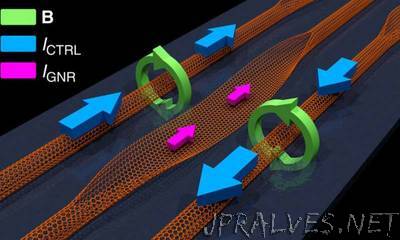
“A researcher with the Erik Jonsson School of Engineering and Computer Science at UT Dallas has designed a novel computing system made solely from carbon that might one day replace the silicon transistors that power today’s electronic devices. “The concept brings together an assortment of existing nanoscale technologies and combines them in a new way,” said Dr. Joseph S. Friedman, assistant professor of electrical and computer engineering at UT Dallas who conducted much of the research while he was a doctoral student at Northwestern University. The resulting all-carbon spin logic proposal, published by lead author Friedman and several collaborators in the June 5 edition of the online journal Nature Communications, is a computing system that Friedman believes could be made smaller than silicon transistors, with increased performance. Today’s electronic devices are powered by transistors, which are tiny silicon structures that rely on negatively charged electrons moving through the silicon, forming an electric current. Transistors behave like switches, turning current on and off. In addition to carrying a charge, electrons have another property called spin, which relates to their magnetic properties. In recent years, engineers have been investigating ways to exploit the spin characteristics of electrons to create a new class of transistors and devices called “spintronics.””
